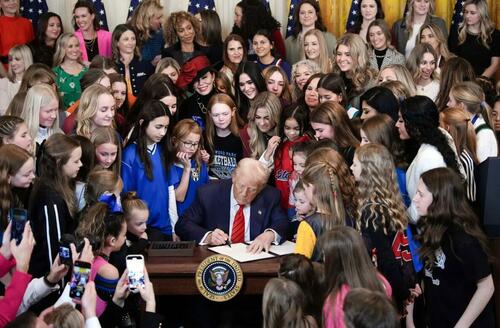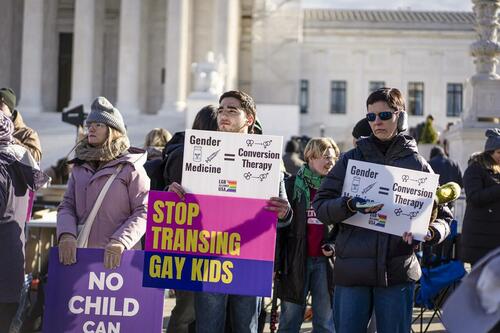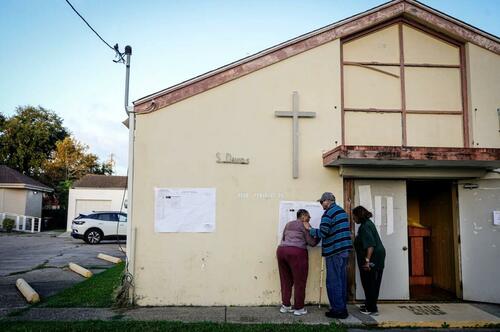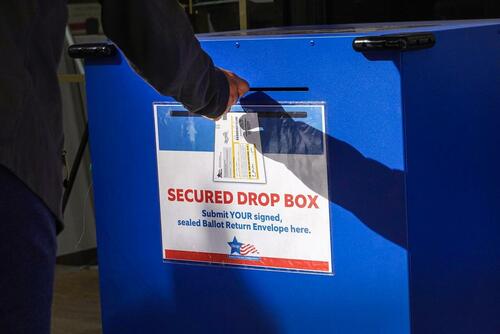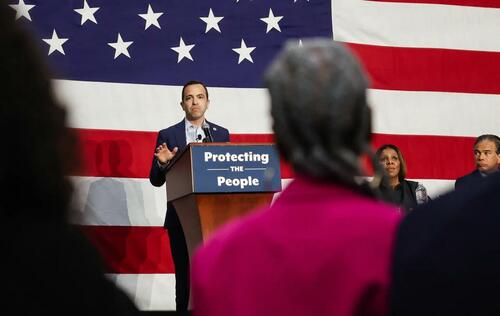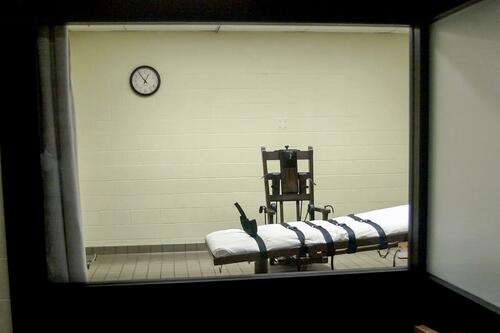

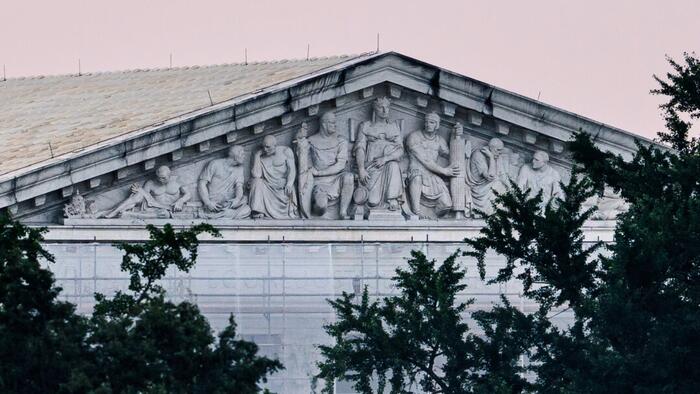
Authored by Matthew Vadum, Sam Dorman, Stacy Robinson via The Epoch Times,
The Supreme Court will hear cases in the fall and winter dealing with hot-button social and political issues, ranging from males competing in female sports to pregnancy centers to redistricting.
After a high-profile ruling in June that allowing Tennessee’s ban on gender procedures for minors, the court will deal with transgender issues again in two cases challenging state bans on males competing in women’s and girls’ sports.
Another case, from New Jersey, looks at whether the pro-abortion state may subpoena donor information from pro-life pregnancy help centers.
The court will also look at three election law cases regarding campaign spending limits, redistricting according to race, and whether ballots received after Election Day can be counted.
Here is a look at the nine biggest cases to watch in the court’s 2025–2026 term, which begins in October.
The Supreme Court has agreed to hear two cases tackling the issue of males competing against women in sports.
States have passed laws forbidding this practice, and in the cases Little v. Hecox and West Virginia v. B.P.J., transgender-identifying youth have sued to overturn those laws. In both cases, the plaintiffs said the laws violated the equal protection clause of the 14th Amendment, as well as Title IX, a law that prohibits sex-based discrimination in schools that receive federal funds.
In March 2020, Idaho Gov. Brad Little signed a law banning men from women’s sports; the law still allows women who identify as males to compete with men.
Lindsay Hecox, a male who identifies as female, filed a suit challenging the law. Hecox wanted to compete on the Boise State University women’s teams for track and cross-country.
The district court ruled in favor of Hecox. The U.S. Court of Appeals for the Ninth Circuit upheld that decision in June 2024, finding that the law violated the equal protection clause by targeting transgender-identifying people. The appeals court also blocked the ruling from applying to parties not directly involved in the case.
Idaho appealed, which was accepted by the Supreme Court.
In West Virginia, a transgender-identifying middle-schooler known as B.P.J. in court documents sued to challenge the state’s Save Women’s Sports Act. B.P.J. had been participating in girls’ cross-country and track-and-field teams, regularly defeating female athletes, a court petition reads.
The state law, enacted in 2021, stipulates that women’s teams based on “competitive skill” or involving “a contact sport” must not be open to men.
Initially, a district court temporarily blocked the state law while the case was pending. But in its final decision, the court reversed the block and ruled that the law was constitutional. It found that the law actually strengthened Title IX, rather than violating it.
The U.S. Court of Appeals for the Fourth Circuit paused this decision. In April 2023, the Supreme Court declined to lift the block while the case was playing out in the lower court. Justices Clarence Thomas and Samuel Alito dissented.
In April 2024, the appeals court, in a 2–1 decision, found that the law breached Title IX by discriminating against B.P.J. on the basis of sex.
The majority said the state had argued that “the Act does not discriminate based on gender identity because it treats all ‘biological males’—that is, cisgender boys and transgender girls—the same.”
“But that is just another way of saying the Act treats transgender girls differently from [biological] girls, which is—literally—the definition of gender identity discrimination,” it said.
President Donald Trump, joined by women athletes, signs the No Men in Women’s Sports executive order at the White House on Feb. 5, 2025. The Supreme Court is set to revisit transgender issues in two upcoming cases challenging state bans on males competing in women’s and girls' sports. Andrew Harnik/Getty Images
Judge G. Steven Agee of the Fourth Circuit disagreed.
“It is not enough—and is actually irrelevant when it comes to competitive sports—that B.P.J. identifies as a girl,” he wrote in his dissent.
“Gender identity, simply put, has nothing to do with sports. It does not change a person’s biology or physical characteristics. It does not affect how fast someone can run or how far they can throw a ball. Biology does.”
This is the latest case dealing with transgender issues to hit the high court. The past term saw a 6–3 court upholding a Tennessee ban on the use of cross-sex hormones and puberty blockers for minors experiencing gender dysphoria.
In 2020, the court in Bostock v. Clayton County ruled 6–3 that federal law bars employees from being fired from their jobs because of their sexual orientation or gender identity.
President Donald Trump has issued a series of executive orders that have affected people identifying as transgender. One order banned such individuals from military service. Lower courts blocked that order, but in May, the Supreme Court temporarily reinstated it to allow litigation challenging it to proceed in the appeals court.
In 2019, Colorado passed a law banning therapists from providing so-called “conversion therapy” for minors experiencing same-sex attraction or gender dysphoria.
Any efforts to “change an individual’s sexual orientation, including efforts to change behaviors or gender expressions or to eliminate or reduce sexual or romantic attraction or feelings toward individuals of the same sex” are prohibited, according to the law.
However, under the law, therapists are allowed to affirm same-sex attraction or a minor’s desire to change his or her gender.
Kaley Chiles, a licensed therapist in Colorado, sued in September 2022 to overturn the law on First Amendment grounds, both for herself and on behalf of her clients.
In her complaint, Chiles alleged that the law chills her free speech because she is forced to avoid some areas of conversation during her therapy sessions. It also prevents minors from seeking therapy for unwanted feelings and behaviors, “even when the client desires and freely consents to such counseling,” she alleged.
Colorado argued that the law does not directly regulate speech, only Chiles’s conduct as a licensed therapist. The state says these therapies are harmful and increase mental distress and thoughts of suicide in minors.
District Judge Charlotte Sweeney of the U.S. District Court for the District of Colorado agreed with the state, and ruled in December 2022 that states may regulate conduct, even if that conduct “incidentally” involves speech.
“As Defendants argue, speech made in a professional context—particularly in the context of licensed professional counseling—is distinguishable from, for example, political speech,” she wrote in her opinion.
People protest outside the Supreme Court as justices hear a case on banning gender procedures for minors, in Washington on Dec. 4, 2024. The court is set to hear two cases involving Idaho and West Virginia, where laws bar males from competing in female sports. Madalina Vasiliu/The Epoch Times
“The Minor Therapy Conversion Law is viewpoint neutral and does not impose content-based speech restrictions.”
In September 2024, the U.S. Court of Appeals for the 10th Circuit upheld the district court’s ruling in a 2–1 decision, agreeing that Chiles’s speech was only “incidental” to restrictions on her conduct as a therapist.
“In my view, and, more importantly, in the view of the United States Supreme Court, such wordplay poses a serious threat to free speech,” Judge Harris Hartz wrote in his dissent.
“I daresay any speech that a government finds offensive could be placed within a field of conduct and, under the analysis of the majority opinion, regulated as ‘incidental’ to regulation of that field of conduct.”
The Supreme Court’s ruling in this case will affect dozens of other states that have similar restrictions.
The Supreme Court will again consider whether an election map for Louisiana that includes two black-majority congressional districts discriminates against non-black voters.
In Louisiana v. Callais, a federal district judge ruled that an earlier version of the map, which provided for one black-majority congressional district, discriminated against black voters, who constitute nearly one-third of the state’s population. The judge ordered district lines in the state moved to create a second black-majority district.
A group of non-black voters sued, arguing that the map discriminated against non-minorities. A three-judge federal panel agreed and reinstated the previous map. In May 2024, the Supreme Court ordered the state to use the map that contained the second black-majority district in that year’s elections.
The Supreme Court heard oral arguments in the case in March, but declined to issue a ruling in June. Instead, the court ordered, without explanation, that the case be reargued in the upcoming term.
Thomas dissented, saying there was “no reason” to avoid deciding the case.
“Congress requires this Court to exercise jurisdiction over constitutional challenges to congressional redistricting, and we accordingly have an obligation to resolve such challenges promptly,” Thomas said.
J. Christian Adams, president of the Public Interest Legal Foundation, said the court will likely strike down the map with two black-majority districts.
“You can’t draw district lines based on race, and this affects everything from Congress on down to county council,” he said.
“When you say you’re maximizing black seats that you’re going to draw on the basis of race, you violate the 15th Amendment.”
People arrive to vote at a polling station in New Orleans on Nov. 5, 2024. In its upcoming term, the Supreme Court will review whether Louisiana’s congressional map with two black-majority districts discriminates against non-black voters. Sandy Huffaker/AFP via Getty Images
That amendment says a citizen’s right to vote may not be denied based on race or color.
The outcome of the case may affect the balance of power in the legislative branch. Currently, Republicans maintain a thin majority over Democrats in the House of Representatives.
Republicans won four of Louisiana’s six U.S. House districts in the 2024 elections, and Democrats won two. After the 2022 elections, Republicans had five seats compared with the Democrats’ single seat.
The Supreme Court will look at whether federal limits on how much political parties can spend in coordination with candidates violate the free speech protections of the Constitution’s First Amendment.
The case is National Republican Senatorial Committee v. Federal Election Commission.
Restrictions on spending by party committees that are coordinated with candidates for Congress and president were created on the theory that not having limits encourages corruption and allows wealthy donors to have outsized influence.
The rules in 2025 allow coordinated party spending for Senate races, ranging from $127,200 in a few states with small populations to almost $4 million in California. The limit for House races is $63,600, but rises to $127,200 in states that have only one House representative.
Two Republican party committees, Vice President JD Vance, and former Rep. Steve Chabot (R-Ohio) challenged the limits in the Federal Election Campaign Act.
“A political party exists to get its candidates elected,” they said in their petition filed with the Supreme Court in December 2024. “Yet Congress has severely restricted how much parties can spend on their own campaign advertising if done in cooperation with those very candidates.”
The petition noted that Congress had built a wall of separation between party and candidate, “forcing party committees to figure out how to get their candidates elected without hearing from them.”
Sen. JD Vance (R-Ohio) speaks to reporters after the CNN Presidential Debate at Georgia Tech in Atlanta on June 27, 2024. Vance and former Rep. Steve Chabot (R-Ohio) petitioned the Supreme Court in December 2024 to challenge the limits on how much political parties can spend in coordination with candidates in the Federal Election Campaign Act. Andrew Harnik/Getty Images
That is the “equivalent of prohibiting communication between a coach and quarterback late in a tied game,” the petition reads.
In September 2024, the U.S. Court of Appeals for the Sixth Circuit ruled against the Republican challengers.
It found “coordinated party expenditure limits” are inconsistent with recent Supreme Court rulings on the First Amendment, but noted that the high court upheld them in the 2001 decision of Federal Election Commission v. Colorado Republican Federal Campaign Committee.
The Supreme Court will take up a congressman’s challenge to an Illinois law that allows ballots to be counted if they are received up to 14 days after Election Day.
The case is Bost v. Illinois State Board of Elections.
A victory for the challenger, Rep. Michael Bost (R-Ill.), could open the door to more lawsuits being filed in other states against the late counting of ballots.
Eighteen states, including Illinois, accept mailed ballots received after Election Day if they bear a postmark from Election Day or before that date, according to the National Conference of State Legislatures. The District of Columbia, Guam, Puerto Rico, and the Virgin Islands also follow the same rule.
Bost sued in 2022, saying the Illinois law extending counting beyond Election Day conflicts with federal law, which takes precedence over state law.
State laws allowing post-election vote counting are preempted, or superseded, by the Constitution’s elections and elector clauses, his petition filed with the Supreme Court reads.
“Federal law sets the first Tuesday after the first Monday in November as the federal Election Day,” Bost said.
However, a federal district judge did not reach the merits of the case, ruling that Bost lacked standing to proceed. Standing refers to the right of someone to sue in court. A party must show a strong enough connection to a claim to justify its participation in a lawsuit.
The fact that Bost is a political candidate was not enough to establish standing, even though his campaign incurs additional expenses while monitoring the receipt and counting of ballots after Election Day, the judge ruled.
The U.S. Court of Appeals for the Seventh Circuit affirmed the ruling in August 2024, finding that Bost had merely “a generalized grievance affecting all Illinois voters.”
A resident drops off a vote-by-mail ballot in a drop box in Chicago on Oct. 2, 2020. The Supreme Court will take up Rep. Michael Bost's (R-Ill.) challenge to an Illinois law that allows ballots to be counted if they are received up to 14 days after Election Day. Scott Olson/Getty Images
After the Supreme Court decided on June 2 to hear the appeal, Judicial Watch, which brought the appeal on Bost’s behalf, hailed that decision.
“It is an injustice that the courts would deny a federal candidate the ability to challenge an election provision that could lead to illegal votes being cast and counted for two weeks after Election Day,” Judicial Watch President Tom Fitton said.
The case is about whether a congressional candidate has standing to sue. If Bost wins at the Supreme Court, the case will return to the trial court, which may hear his Election Day arguments.
The petitioner, First Choice Women’s Resource Centers, came under fire in late 2023 when New Jersey Attorney General Matt Platkin accused the pregnancy center of violating the New Jersey Consumer Fraud Act.
First Choice provides free counseling for unplanned pregnancies, but does not perform abortions or abortion referrals.
Platkin issued a subpoena for First Choice’s donor records, saying the nonprofit organization was misleading its clients and donors because its donor web page openly touts its pro-life stance, while its client web page does not.
Donor information is closely guarded in the nonprofit community. Donors generally want their identities to be protected so that they will not be subject to harassment by political opponents and hostile governments.
Platkin also accused First Choice of misinformation, and said its claims that chemical abortions can be reversed may be “misleading or untrue.”
Platkin, along with 15 other state attorneys general, signed a letter in October 2023 denouncing “anti-abortion crisis pregnancy centers” and accusing them of using “deceptive tactics to lure in patients seeking reproductive healthcare.”
He issued his subpoena to First Choice the next month, and the nonprofit sued in federal district court to block it. The district court declined to halt the subpoena, saying it was too early to act because no state court had yet issued an order to enforce it.
The nonprofit appealed the district court’s refusal to block the subpoena to the U.S. Court of Appeals for the Third Circuit, which declined to pause the subpoena. In May 2024, the Supreme Court also declined to halt the subpoena.
In January 2024, Platkin asked the New Jersey Superior Court to enforce the subpoena, triggering multiple rounds of litigation in state and federal courts.
New Jersey Attorney General Matt Platkin speaks at a town hall at SUNY Westchester Community College in Valhalla, N.Y., on May 8, 2025. The Supreme Court will consider whether New Jersey can subpoena donor records from First Choice Women’s Resource Centers, a pro-life nonprofit. Spencer Platt/Getty Images
Eventually, the Third Circuit ruled again that the case was still not ripe, or ready to be heard by that court, because First Choice could still make First and Fourth Amendment arguments—about free speech and search and seizure—in lower courts.
On June 16, the Supreme Court revisited the case and agreed to consider whether the state may subpoena the nonprofit’s donor records.
Gabriel Olivier is a street preacher and evangelist. In 2021, he was arrested and charged with violating a city ordinance from Brandon, Mississippi, which designates a particular protest area for demonstrations at events. According to court documents, a group of people, including Olivier, showed up to a concert in 2021 and called people things such as “whores,” “Jezebels,” and other names.
When he got to court, Olivier pleaded no contest and was given a suspended sentence of 10 days in prison.
The Supreme Court is not dealing so much with that sentence as with the question of whether a later lawsuit by Olivier could proceed in court. After his initial conviction, Olivier tried to file a civil lawsuit under a law known as Section 1983, which allows individuals to sue governments if they violate constitutional or statutory rights. Olivier said the city’s ordinance violated his right to share his faith.
However, because Olivier already had a criminal conviction over the ordinance, the U.S. Court of Appeals for the Fifth Circuit said he could not sue again over that policy’s constitutionality. That is because, in 1994, the Supreme Court issued a decision known as Heck v. Humphrey, which said Section 1983 lawsuits cannot be brought if success in those lawsuits “would necessarily imply the invalidity of a prior conviction.” According to the appeals court, that was the case with Olivier.
Olivier told the Supreme Court that the Fifth Circuit’s decision was wrong because he was never detained. Because he was not detained, he could not challenge the ordinance’s constitutionality through something known as a habeas corpus, he told the court.
Should a wounded Afghanistan veteran be able to sue a government contractor if it was liable for the events that led to his injuries? According to courts, it is complicated, and contractors may enjoy some level of immunity under federal law.
Ahmad Nayeb, an Afghan national and employee of a government contractor, Fluor Corp., carried out a suicide bombing on a U.S. military base in 2016. His actions killed some and injured many, including former U.S. Army Spc. Winston Hencely, who was left with permanent injuries that will likely require lifelong care.
Hencely sued Fluor Corp. after an Army investigation found that the company failed to properly supervise Nayeb, who was likely able to construct his bomb vest within the perimeter of the base’s grounds.
Hencely lost in the U.S. Court of Appeals for the Fourth Circuit and is asking the Supreme Court to revisit how the appeals judges interpreted a law known as the Federal Tort Claims Act. That law generally allows people to sue the federal government over things such as personal injury, but contains an exception for combatant activities of the armed forces.
Members of the military march in the annual Veterans Day Parade in New York City on Nov. 11, 2022. The Supreme Court is set to review whether the Fourth Circuit properly applied the Federal Tort Claims Act, which allows lawsuits against the federal government but exempts combatant activities of the armed forces. Spencer Platt/Getty Images
Hencely had attempted to sue under state law in South Carolina, where Fluor entities maintain a place of business. Although Hencely sued under state law, a legal concept known as “preemption” allows federal law to take precedence or control a particular issue if it overlaps with matters covered by state law.
The appeals court rejected Hencely’s claims on this basis, ruling that the Federal Tort Claims Act trumped South Carolina’s law on liability. A panel of judges acknowledged that the federal law’s exception, on its terms, did not apply to contractors. But they held that significant policy interests dictated that the exception should apply to military contractors.
The Supreme Court is set to review whether the Fourth Circuit applied the Federal Tort Claims Act correctly.
In 2002, the Supreme Court said intellectually disabled criminals could not be sentenced to death because this would violate the Eighth Amendment’s bar on excessive punishment.
Since then, courts have attempted to apply that ruling to cases in lower courts. One such case is Hamm v. Smith, which involves a man, Joseph Clifton Smith, who received multiple IQ scores of a little more than 70 points. An average IQ score is 90 to 115 points.
A jury in Alabama found Smith guilty of murder, for which he was later sentenced to death. However, before his sentence was completed, the Supreme Court issued its 2002 decision on intellectual disability. After a series of appeals, a federal court eventually removed his death sentence on the basis that he could have an IQ of less than 70, which is the state’s benchmark for intellectual disability.
According to court documents, Smith had five scores—75, 74, 72, 78, and 74. Although all five of Smith’s IQ scores were higher than 70, four were low enough that the margin of error made it possible that his actual score was lower than 70.
A panel of appellate judges said that in order to use IQ to maintain the death penalty, the state had to have evidence strong enough to foreclose the possibility of his actual IQ being lower than 70.
A view of the death chamber from the witness room at the Southern Ohio Correctional Facility shows an electric chair and gurney in Lucasville, Ohio, on Aug. 29, 2001. Alabama and the Trump administration asked the Supreme Court to review claims that an appeals court was misapplying IQ scores in death penalty cases. Mike Simons/Getty Images
Because the state did not present this type of evidence, the appeals court said other factors could be considered in determining whether Smith was too intellectually disabled to receive the death penalty.
Alabama and the Trump administration sought Supreme Court review, arguing that the appeals court was mishandling IQ scores. Instead, they said, courts could consider the cumulative effect of multiple IQ scores when deciding whether a death sentence can proceed.

